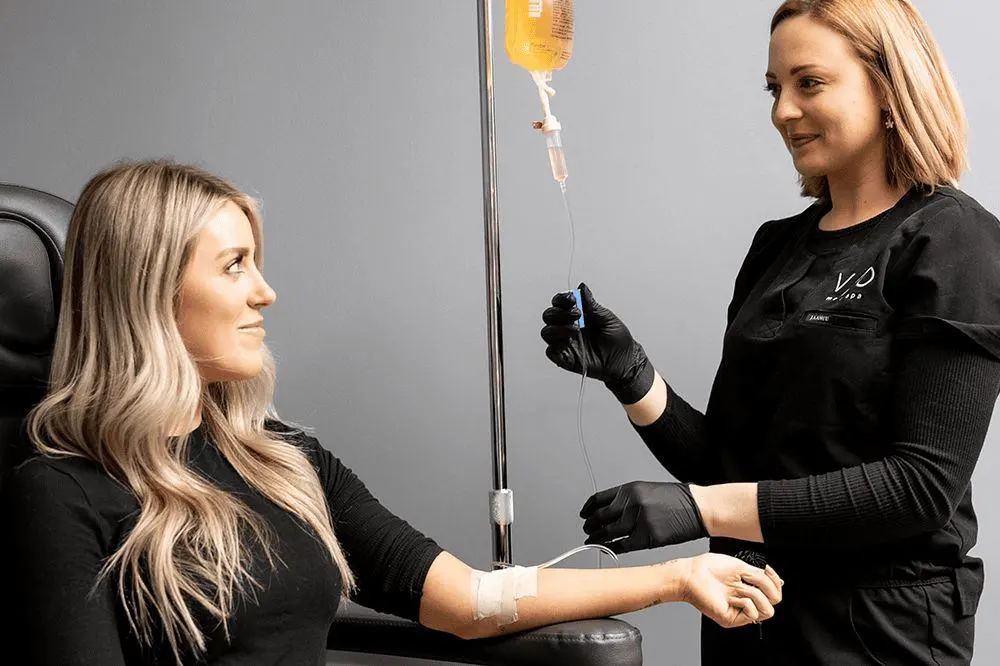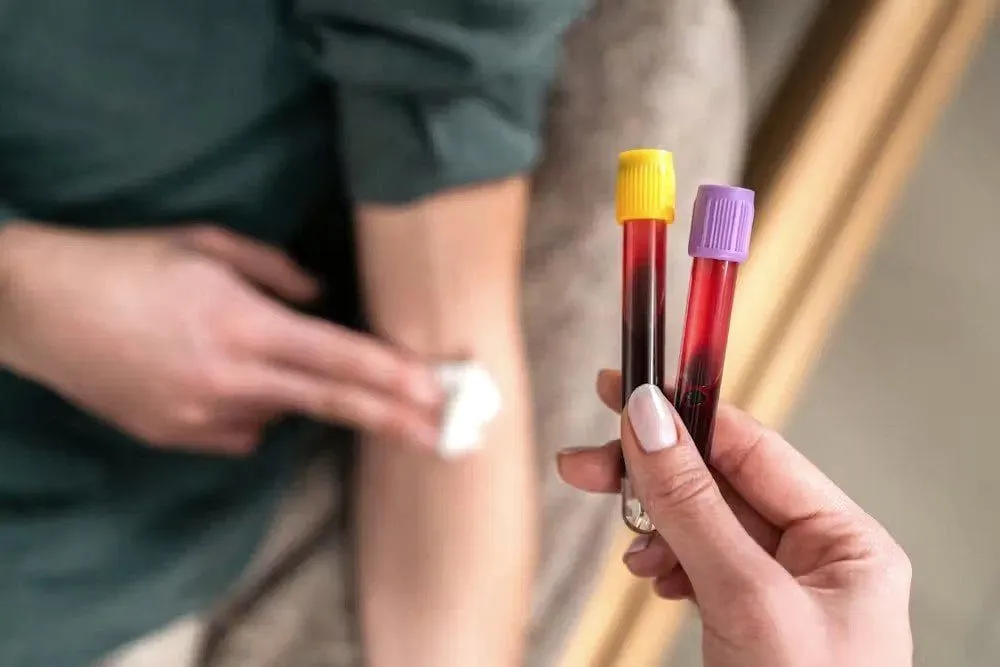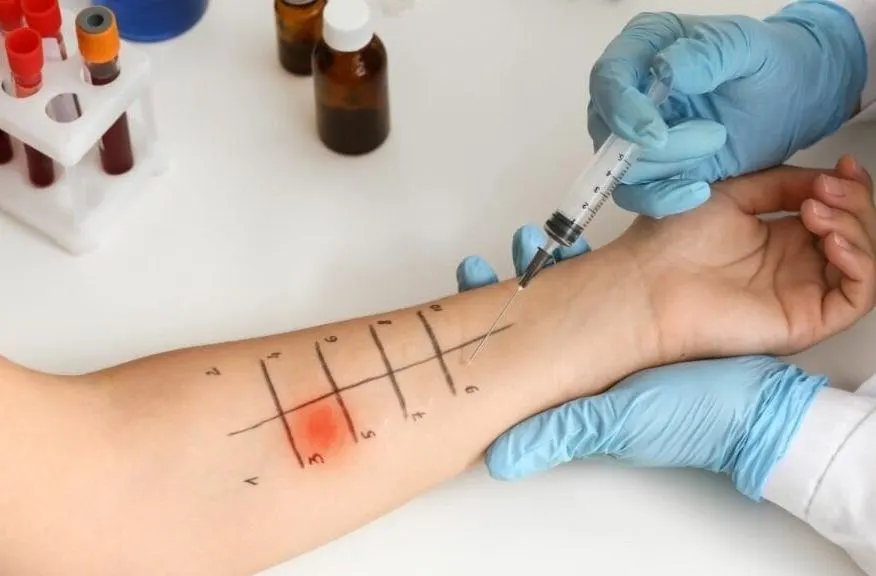Mastering Your Diet Through the Precision of
Food Intolerance and Allergy Testing
Accurate Food Sensitivity Testing!
Read in Arabic
Sometimes all you need is a test for early detection and treatment of a serious illness or a deadly disease. Are you curious about any kind of allergies or food intolerance and observed some related to them? Then read below to learn more about Food Intolerance and Allergy Testing in Riyadh and book us.
Procedure Time
30- 60 Mins
Downtime
Minimal
Back to Work
Immediate
Results
15 - 20 Mins
Quick Facts
- Cost: Variable on tests
- Results: Disclosure of allergies and food intolerance
- Back to Work: Within a few hours
- Duration of Tests: 12 to 18 Mins
Food Intolerance and Allergies!
Food intolerance and food allergies represent separate manners in which our bodies can respond unfavorably to the foods we ingest. It is imperative to grasp the disparities between these two conditions to effectively oversee your nutritional well-being. Let us explore the details of food intolerance and allergy assessments:
Difference
Aspect | Food Intolerance | Food Allergy |
Definition | Adverse reactions to food or its constituents unrelated to allergies. | The body’s immune response to particular proteins found in certain foods. |
Symptoms | May encompass sensations like abdominal distension, flatulence, stomach discomfort, loose stools, or migraines. | The symptoms can vary in intensity and impact different bodily functions. |
Culprits | Frequent suspects encompass lactose, gluten, additives in food, and particular dietary compounds. | Typical allergenic culprits encompass peanuts, tree nuts, shellfish, fish, eggs, dairy, soy, and wheat. |
Testing Methods | To pinpoint particular intolerances, methodologies like exclusion diets, and blood examinations are commonly employed. | Methods such as dermal prick assessments and oral ingestion trials are employed to pinpoint particular allergies. |
Timing of Reactions | Responses typically hinge on the quantity of the problematic food ingested, with symptoms arising once a specific threshold is crossed. | Allergic responses typically manifest shortly after the consumption of the offending food. |
Testing Procedures
The examinations performed to identify food intolerances and allergies have demonstrated their efficacy in pinpointing specific food items that could potentially trigger allergic reactions or intolerance symptoms. Presented below is an overview of various diagnostic methods employed for Food Intolerance and Allergy Testing in Riyadh, aimed at delivering accurate results:
Find Out What’s Causing Your Symptoms – Schedule a Food Intolerance Test Now at Enfield Royal Clinic Saudia!
Methods for Assessing Food Intolerance
- Elimination from the Diet: This approach entails excluding suspected trigger foods from one’s dietary intake for a designated period (typically a few weeks). Subsequently, the foods are gradually reintroduced individually, all the while monitoring for the reappearance of symptoms. This method assists in identifying the precise foods responsible for adverse reactions.
- Breath Analyses: Breath examinations can identify particular types of food intolerance, such as lactose intolerance or fructose malabsorption. During this assessment, individuals ingest a specific substance, and samples of breath are collected at specific intervals to gauge the gases produced during the digestion process.
- Blood Analyses: While blood tests for food intolerance are accessible, their reliability can fluctuate. These tests gauge the levels of antibodies like IgG, which could signify reactions to specific foods.
- Fecal Analyses: Stool examinations can be employed to identify specific categories of food intolerances, particularly those associated with malabsorption challenges. These tests assess the presence of undigested food particles or particular markers within the fecal matter.
Food Allergy Testing Methods

- Cutaneous Puncture Assessments: Skin puncture evaluations entail the application of a minor quantity of allergenic food extract to the skin, typically on the forearm or back. Subsequently, a healthcare provider creates punctures or scratches on the skin to facilitate the entry of the allergen. If an allergy is present, a reaction in the form of an elevated bump or redness becomes apparent within approximately 15-20 minutes.
- Hematological Testing: Blood examinations gauge the levels of specific antibodies known as immunoglobulin E that the body generates in response to allergens. These tests are capable of identifying allergens linked to immediate-type allergic responses.
- Oral Food Challenges: In instances where the diagnosis remains uncertain, oral food challenges are administered under medical supervision. Small, incremental quantities of the suspected allergen are consumed, and the individual’s condition is closely observed for any allergic reactions.
- Patch-Based Testing: Patch-based assessments are primarily employed to diagnose contact allergies, such as skin allergies. Minor amounts of allergenic substances are applied to patches, which are then affixed to the skin. The emergence of a skin reaction at the patch site may indicate an allergy to the substance.
- Component-Resolved Diagnosis: CRD is a specialized blood test designed to pinpoint the specific proteins within an allergenic food that trigger an allergic response. This can offer more precise insights into the allergen’s characteristics and its potential reactivity with other substances.
Book Us Now!
Now that you are well educated, we recommend you book an appointment for Food Intolerance and Allergy Testing in Riyadh at our clinic by filling out the form below.
Why Choose Enfield Royal Clinic!
The choice of testing method depends on several factors, including the food characteristics and suspected triggers. At our Enfield Royal Clinic, we properly monitor candidates’ conditions and then execute tests that help to recognize food toxins.
FAQs.
Yes, they are effective, and they identify food toxins during the testing process.
No, these tests are secure and entirely devoid of discomfort.
The occurrence of side effects is quite rare, with only a handful of tests occasionally causing mild itching or swelling.
Most of the tests don’t require numbing but sometimes numbing the area can be used to avoid any kind of pain.
This depends on the kind of test, some tests may take several days and some have outcomes in just a few hours.
Relevant Treatments.

IV Drip at Home in Riyadh
It is a secure therapy that guarantees optimum absorption of important minerals, nutrients, and amino acids. IV Drip at Home in Riyadh is the answer you need if you’re struggling with sensations of weakness, dehydration, and weariness but would want to stay away from clinic visits. The desire is to receive specialized

Affordable Blood Tests at Home in Riyadh
Why drive to the hospital for blood tests? Get cheap and easy home testing as we are offering you Affordable blood tests at home in Riyadh which brings the lab to you without any waiting or obstacles. Enjoy the facilities from the comfort of your own home and initiate your way to better health
Relevant Posts.

Food Intolerance and Allergy Testing Price in Riyadh
Step into the world of precise testing and reveal the hidden culprits behind your distress because feeling good begins with understanding what will be suitable for you! Come join us to explore the Food Intolerance and Allergy Testing Prices in Riyadh. This testing method is the key to unclosing the way to a better healthier life, it supports you to make the available options and live life to the fullest. Read the given information before the therapy.




